HSC230 Assignment: Cultural Safety Action Plan for Mental Healthcare
VerifiedAdded on 2022/12/26
|11
|2848
|97
Report
AI Summary
This assignment presents a detailed cultural safety action plan developed by a student for mental healthcare services. The plan outlines the student's goals to enhance their ability to provide culturally competent care to patients from diverse backgrounds. It includes specific objectives, such as improving cultural assessment skills and increasing awareness of different cultural domains. The assignment identifies necessary resources, including cultural safety workshops, digital library access, and interviews with experienced professionals. It also addresses potential barriers, such as time constraints and cultural biases, and proposes strategies to overcome them. The plan incorporates methods of evaluation, such as feedback from professors and colleagues, mock tests, and reflective writing. The rationale emphasizes the importance of cultural safety in mental health, particularly in addressing stigma and discrimination. The implementation strategy highlights the need for mentorship and time management. The assignment also discusses evidence-based practices and the value of learning from experienced professionals. Finally, the plan includes strategies to respect cultural preferences and evaluate outcomes through regular feedback and real-life scenarios.
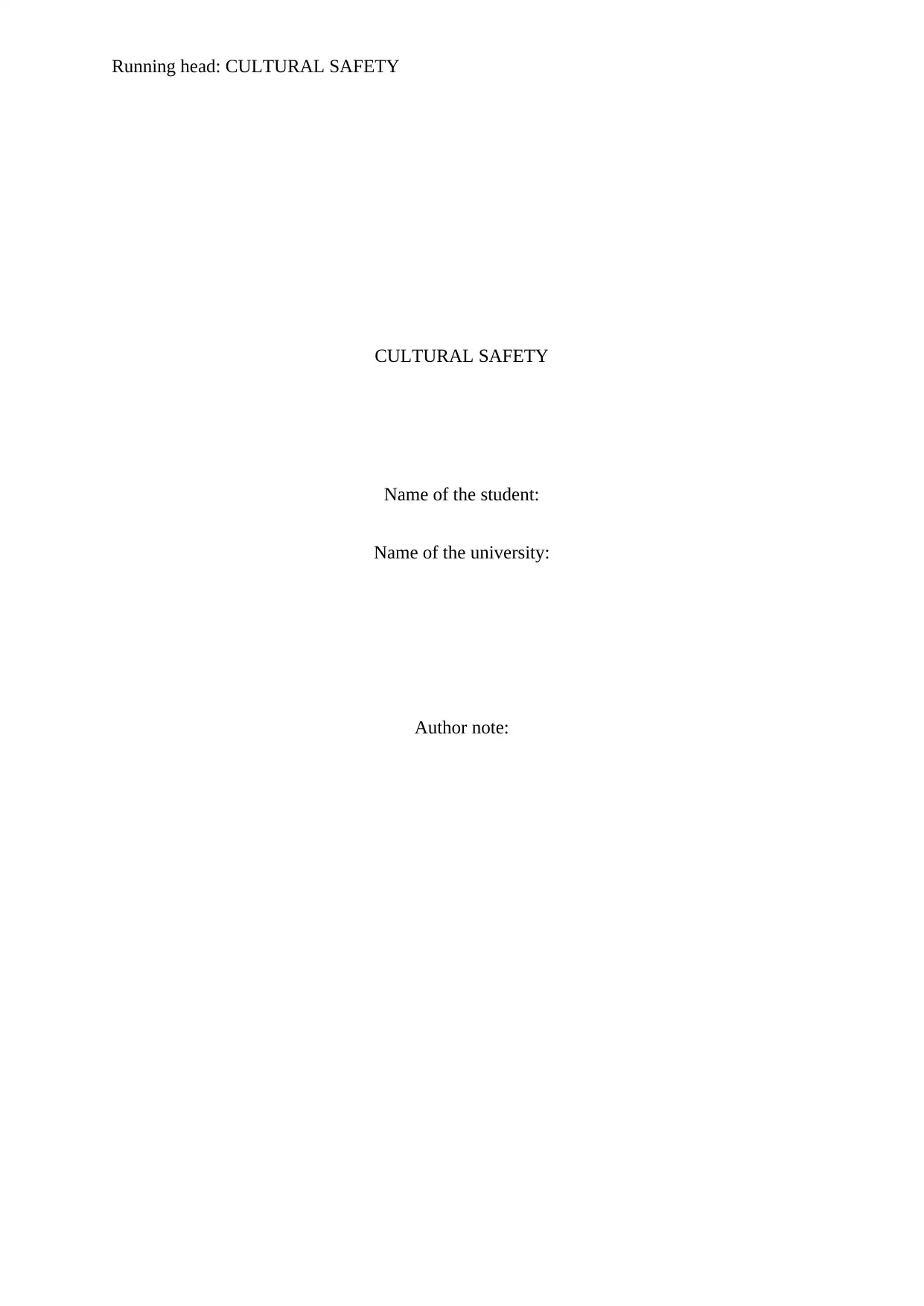
Running head: CULTURAL SAFETY
CULTURAL SAFETY
Name of the student:
Name of the university:
Author note:
CULTURAL SAFETY
Name of the student:
Name of the university:
Author note:
Paraphrase This Document
Need a fresh take? Get an instant paraphrase of this document with our AI Paraphraser
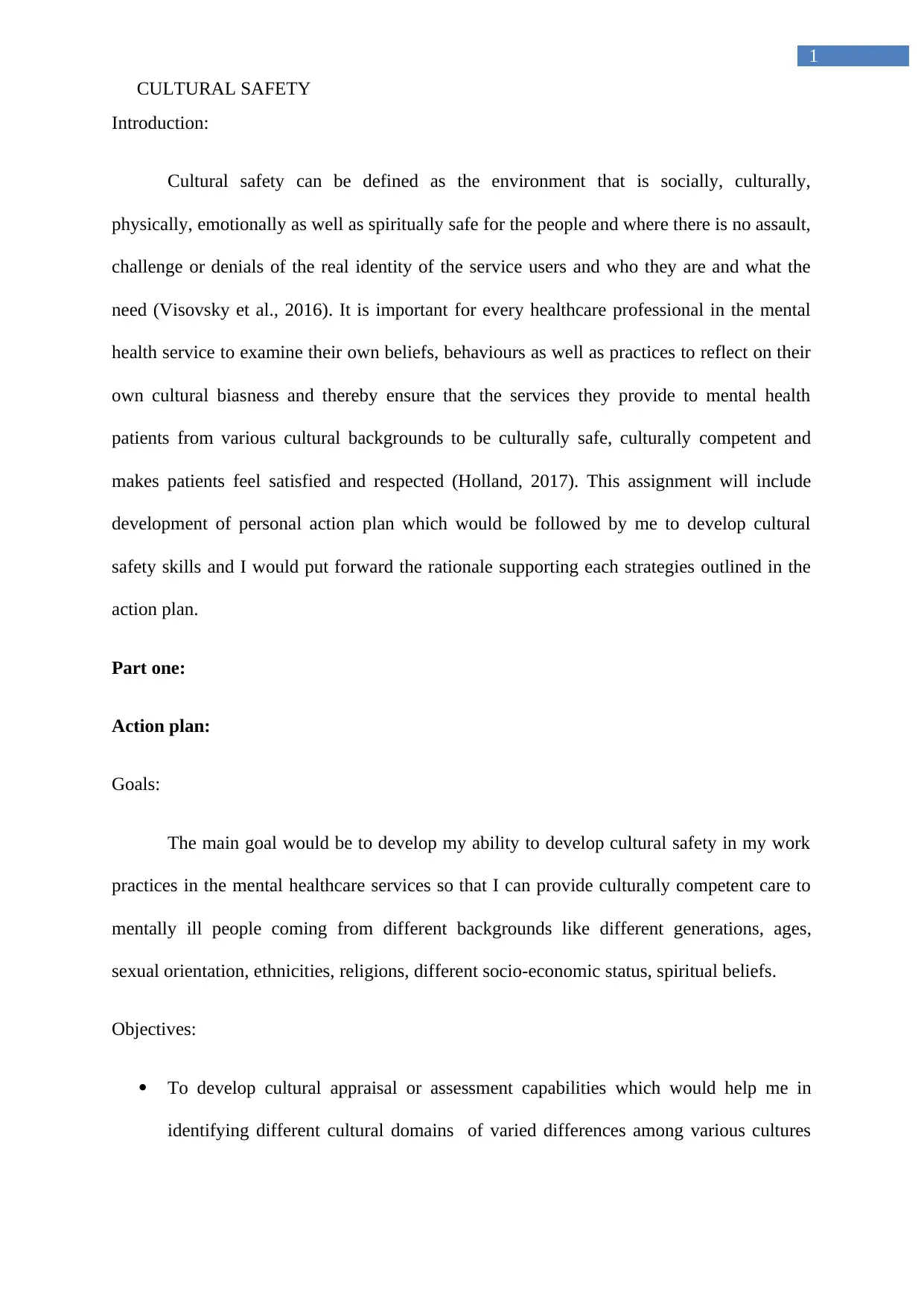
1
CULTURAL SAFETY
Introduction:
Cultural safety can be defined as the environment that is socially, culturally,
physically, emotionally as well as spiritually safe for the people and where there is no assault,
challenge or denials of the real identity of the service users and who they are and what the
need (Visovsky et al., 2016). It is important for every healthcare professional in the mental
health service to examine their own beliefs, behaviours as well as practices to reflect on their
own cultural biasness and thereby ensure that the services they provide to mental health
patients from various cultural backgrounds to be culturally safe, culturally competent and
makes patients feel satisfied and respected (Holland, 2017). This assignment will include
development of personal action plan which would be followed by me to develop cultural
safety skills and I would put forward the rationale supporting each strategies outlined in the
action plan.
Part one:
Action plan:
Goals:
The main goal would be to develop my ability to develop cultural safety in my work
practices in the mental healthcare services so that I can provide culturally competent care to
mentally ill people coming from different backgrounds like different generations, ages,
sexual orientation, ethnicities, religions, different socio-economic status, spiritual beliefs.
Objectives:
To develop cultural appraisal or assessment capabilities which would help me in
identifying different cultural domains of varied differences among various cultures
CULTURAL SAFETY
Introduction:
Cultural safety can be defined as the environment that is socially, culturally,
physically, emotionally as well as spiritually safe for the people and where there is no assault,
challenge or denials of the real identity of the service users and who they are and what the
need (Visovsky et al., 2016). It is important for every healthcare professional in the mental
health service to examine their own beliefs, behaviours as well as practices to reflect on their
own cultural biasness and thereby ensure that the services they provide to mental health
patients from various cultural backgrounds to be culturally safe, culturally competent and
makes patients feel satisfied and respected (Holland, 2017). This assignment will include
development of personal action plan which would be followed by me to develop cultural
safety skills and I would put forward the rationale supporting each strategies outlined in the
action plan.
Part one:
Action plan:
Goals:
The main goal would be to develop my ability to develop cultural safety in my work
practices in the mental healthcare services so that I can provide culturally competent care to
mentally ill people coming from different backgrounds like different generations, ages,
sexual orientation, ethnicities, religions, different socio-economic status, spiritual beliefs.
Objectives:
To develop cultural appraisal or assessment capabilities which would help me in
identifying different cultural domains of varied differences among various cultures
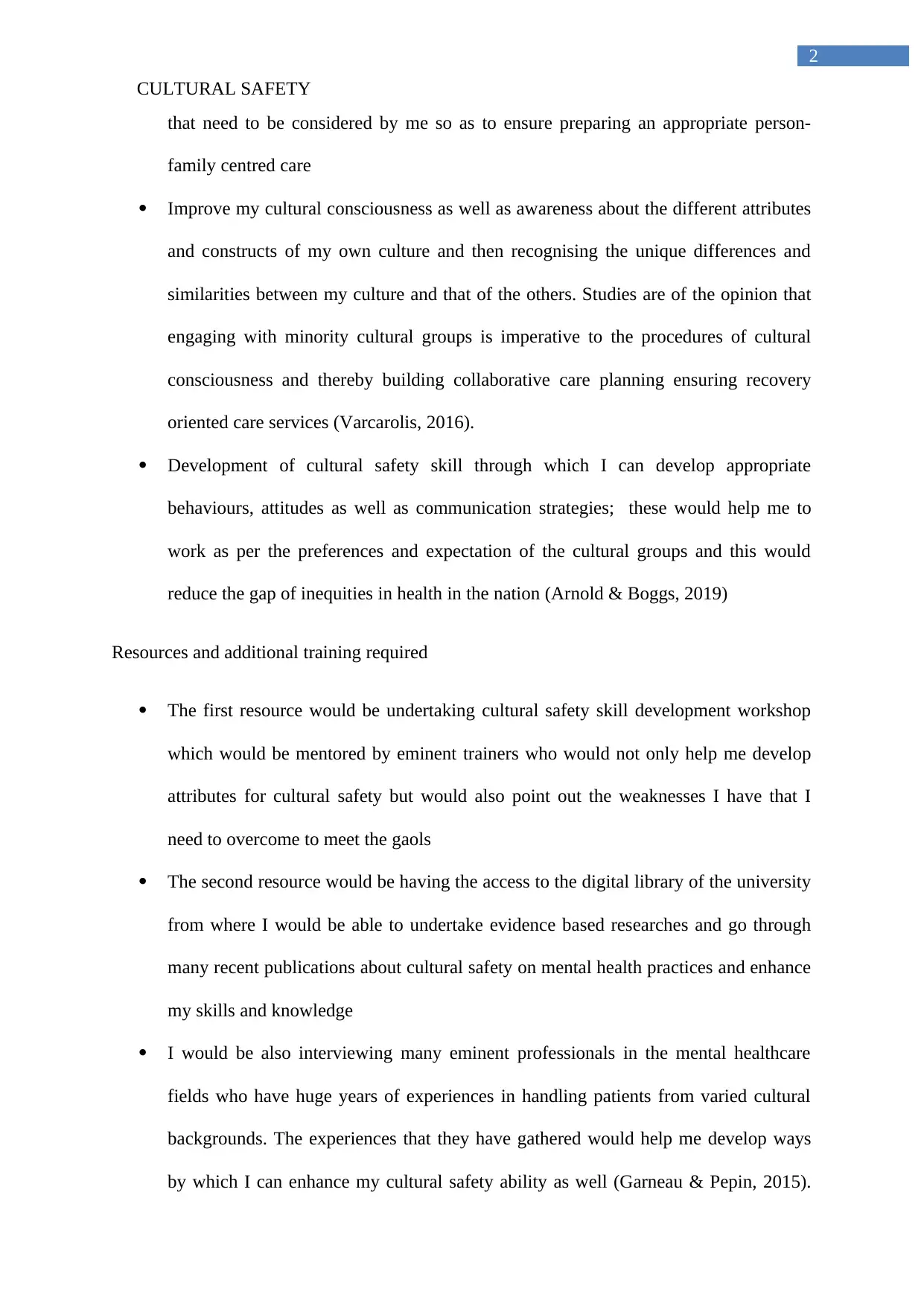
2
CULTURAL SAFETY
that need to be considered by me so as to ensure preparing an appropriate person-
family centred care
Improve my cultural consciousness as well as awareness about the different attributes
and constructs of my own culture and then recognising the unique differences and
similarities between my culture and that of the others. Studies are of the opinion that
engaging with minority cultural groups is imperative to the procedures of cultural
consciousness and thereby building collaborative care planning ensuring recovery
oriented care services (Varcarolis, 2016).
Development of cultural safety skill through which I can develop appropriate
behaviours, attitudes as well as communication strategies; these would help me to
work as per the preferences and expectation of the cultural groups and this would
reduce the gap of inequities in health in the nation (Arnold & Boggs, 2019)
Resources and additional training required
The first resource would be undertaking cultural safety skill development workshop
which would be mentored by eminent trainers who would not only help me develop
attributes for cultural safety but would also point out the weaknesses I have that I
need to overcome to meet the gaols
The second resource would be having the access to the digital library of the university
from where I would be able to undertake evidence based researches and go through
many recent publications about cultural safety on mental health practices and enhance
my skills and knowledge
I would be also interviewing many eminent professionals in the mental healthcare
fields who have huge years of experiences in handling patients from varied cultural
backgrounds. The experiences that they have gathered would help me develop ways
by which I can enhance my cultural safety ability as well (Garneau & Pepin, 2015).
CULTURAL SAFETY
that need to be considered by me so as to ensure preparing an appropriate person-
family centred care
Improve my cultural consciousness as well as awareness about the different attributes
and constructs of my own culture and then recognising the unique differences and
similarities between my culture and that of the others. Studies are of the opinion that
engaging with minority cultural groups is imperative to the procedures of cultural
consciousness and thereby building collaborative care planning ensuring recovery
oriented care services (Varcarolis, 2016).
Development of cultural safety skill through which I can develop appropriate
behaviours, attitudes as well as communication strategies; these would help me to
work as per the preferences and expectation of the cultural groups and this would
reduce the gap of inequities in health in the nation (Arnold & Boggs, 2019)
Resources and additional training required
The first resource would be undertaking cultural safety skill development workshop
which would be mentored by eminent trainers who would not only help me develop
attributes for cultural safety but would also point out the weaknesses I have that I
need to overcome to meet the gaols
The second resource would be having the access to the digital library of the university
from where I would be able to undertake evidence based researches and go through
many recent publications about cultural safety on mental health practices and enhance
my skills and knowledge
I would be also interviewing many eminent professionals in the mental healthcare
fields who have huge years of experiences in handling patients from varied cultural
backgrounds. The experiences that they have gathered would help me develop ways
by which I can enhance my cultural safety ability as well (Garneau & Pepin, 2015).
⊘ This is a preview!⊘
Do you want full access?
Subscribe today to unlock all pages.

Trusted by 1+ million students worldwide
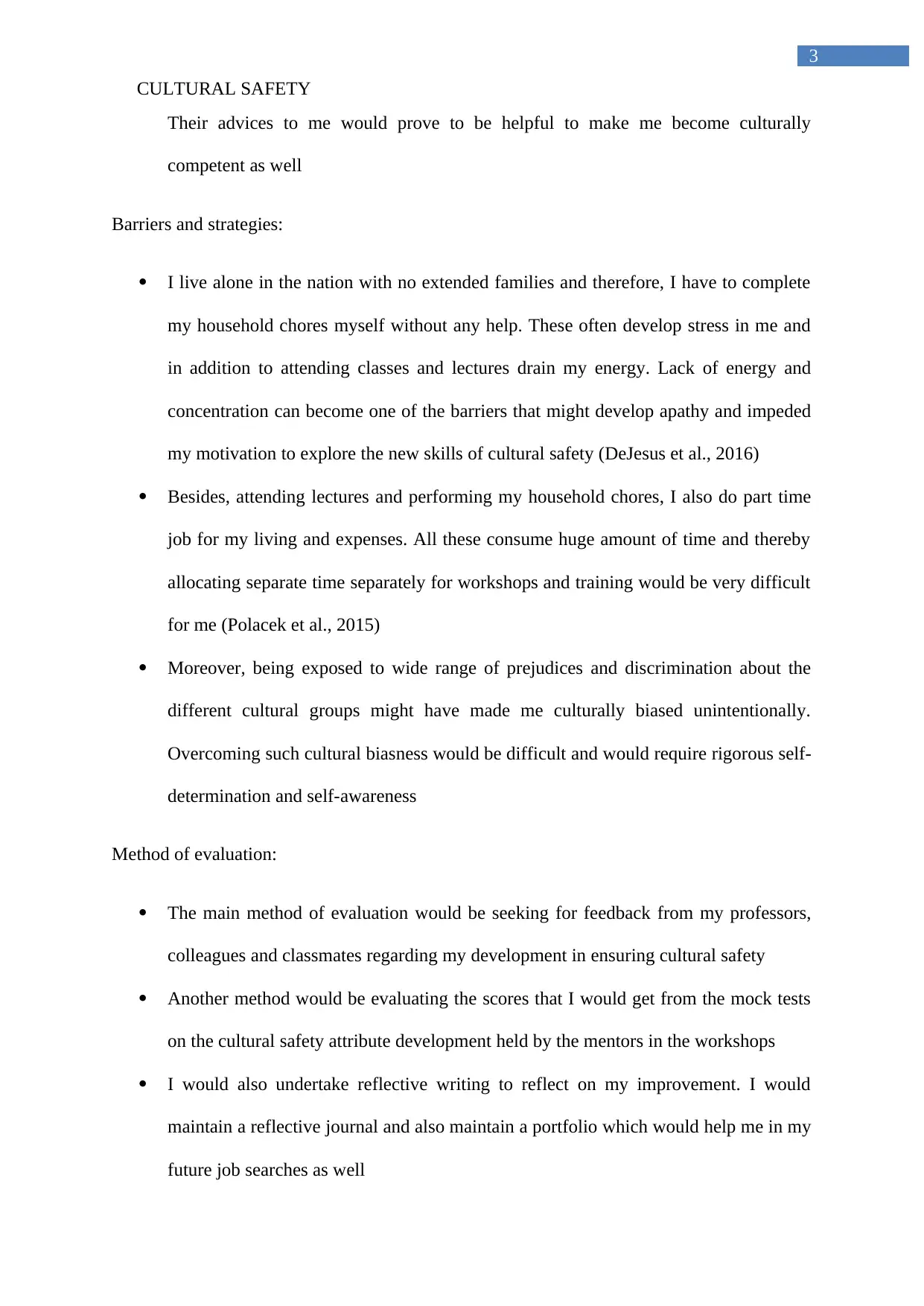
3
CULTURAL SAFETY
Their advices to me would prove to be helpful to make me become culturally
competent as well
Barriers and strategies:
I live alone in the nation with no extended families and therefore, I have to complete
my household chores myself without any help. These often develop stress in me and
in addition to attending classes and lectures drain my energy. Lack of energy and
concentration can become one of the barriers that might develop apathy and impeded
my motivation to explore the new skills of cultural safety (DeJesus et al., 2016)
Besides, attending lectures and performing my household chores, I also do part time
job for my living and expenses. All these consume huge amount of time and thereby
allocating separate time separately for workshops and training would be very difficult
for me (Polacek et al., 2015)
Moreover, being exposed to wide range of prejudices and discrimination about the
different cultural groups might have made me culturally biased unintentionally.
Overcoming such cultural biasness would be difficult and would require rigorous self-
determination and self-awareness
Method of evaluation:
The main method of evaluation would be seeking for feedback from my professors,
colleagues and classmates regarding my development in ensuring cultural safety
Another method would be evaluating the scores that I would get from the mock tests
on the cultural safety attribute development held by the mentors in the workshops
I would also undertake reflective writing to reflect on my improvement. I would
maintain a reflective journal and also maintain a portfolio which would help me in my
future job searches as well
CULTURAL SAFETY
Their advices to me would prove to be helpful to make me become culturally
competent as well
Barriers and strategies:
I live alone in the nation with no extended families and therefore, I have to complete
my household chores myself without any help. These often develop stress in me and
in addition to attending classes and lectures drain my energy. Lack of energy and
concentration can become one of the barriers that might develop apathy and impeded
my motivation to explore the new skills of cultural safety (DeJesus et al., 2016)
Besides, attending lectures and performing my household chores, I also do part time
job for my living and expenses. All these consume huge amount of time and thereby
allocating separate time separately for workshops and training would be very difficult
for me (Polacek et al., 2015)
Moreover, being exposed to wide range of prejudices and discrimination about the
different cultural groups might have made me culturally biased unintentionally.
Overcoming such cultural biasness would be difficult and would require rigorous self-
determination and self-awareness
Method of evaluation:
The main method of evaluation would be seeking for feedback from my professors,
colleagues and classmates regarding my development in ensuring cultural safety
Another method would be evaluating the scores that I would get from the mock tests
on the cultural safety attribute development held by the mentors in the workshops
I would also undertake reflective writing to reflect on my improvement. I would
maintain a reflective journal and also maintain a portfolio which would help me in my
future job searches as well
Paraphrase This Document
Need a fresh take? Get an instant paraphrase of this document with our AI Paraphraser
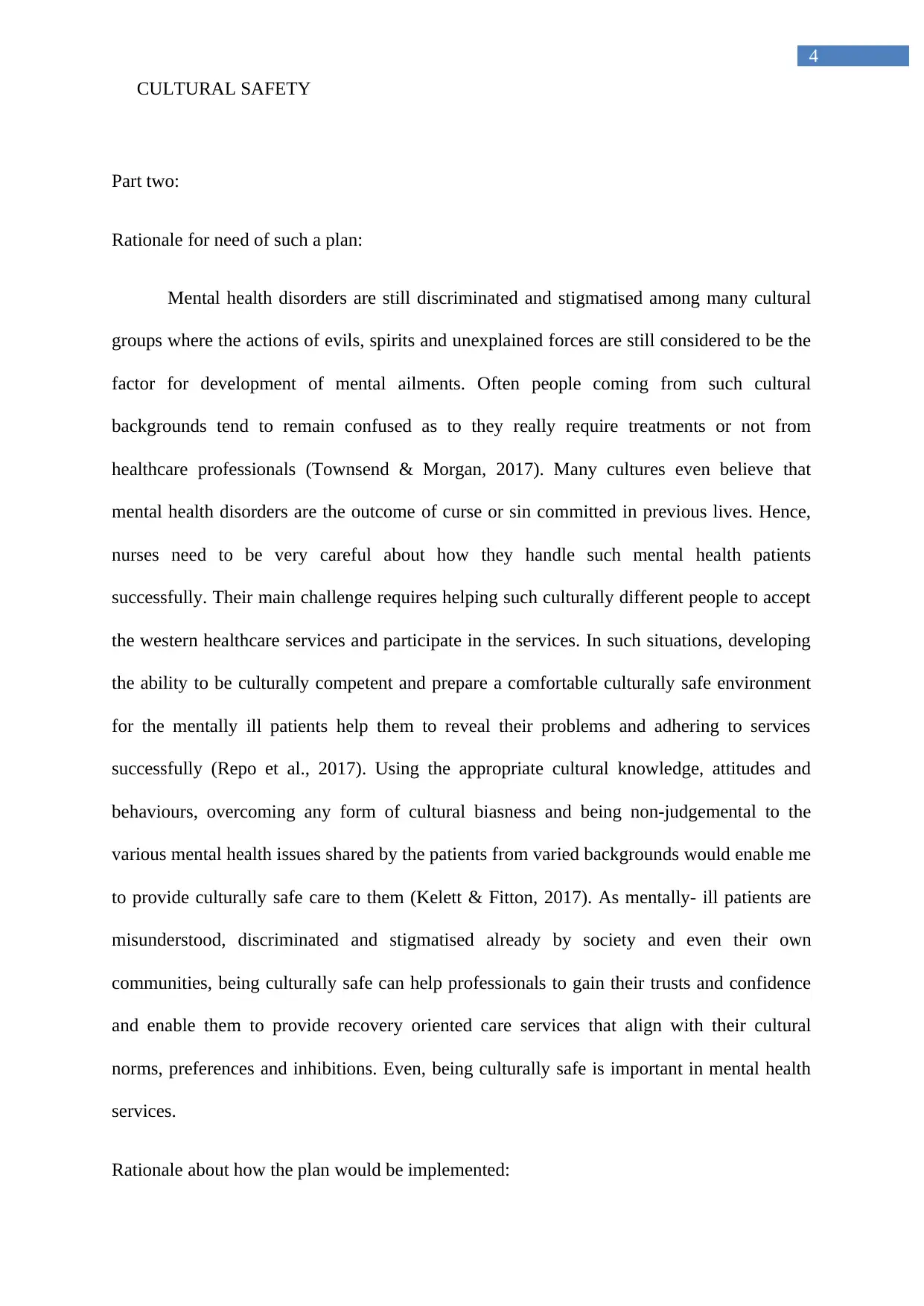
4
CULTURAL SAFETY
Part two:
Rationale for need of such a plan:
Mental health disorders are still discriminated and stigmatised among many cultural
groups where the actions of evils, spirits and unexplained forces are still considered to be the
factor for development of mental ailments. Often people coming from such cultural
backgrounds tend to remain confused as to they really require treatments or not from
healthcare professionals (Townsend & Morgan, 2017). Many cultures even believe that
mental health disorders are the outcome of curse or sin committed in previous lives. Hence,
nurses need to be very careful about how they handle such mental health patients
successfully. Their main challenge requires helping such culturally different people to accept
the western healthcare services and participate in the services. In such situations, developing
the ability to be culturally competent and prepare a comfortable culturally safe environment
for the mentally ill patients help them to reveal their problems and adhering to services
successfully (Repo et al., 2017). Using the appropriate cultural knowledge, attitudes and
behaviours, overcoming any form of cultural biasness and being non-judgemental to the
various mental health issues shared by the patients from varied backgrounds would enable me
to provide culturally safe care to them (Kelett & Fitton, 2017). As mentally- ill patients are
misunderstood, discriminated and stigmatised already by society and even their own
communities, being culturally safe can help professionals to gain their trusts and confidence
and enable them to provide recovery oriented care services that align with their cultural
norms, preferences and inhibitions. Even, being culturally safe is important in mental health
services.
Rationale about how the plan would be implemented:
CULTURAL SAFETY
Part two:
Rationale for need of such a plan:
Mental health disorders are still discriminated and stigmatised among many cultural
groups where the actions of evils, spirits and unexplained forces are still considered to be the
factor for development of mental ailments. Often people coming from such cultural
backgrounds tend to remain confused as to they really require treatments or not from
healthcare professionals (Townsend & Morgan, 2017). Many cultures even believe that
mental health disorders are the outcome of curse or sin committed in previous lives. Hence,
nurses need to be very careful about how they handle such mental health patients
successfully. Their main challenge requires helping such culturally different people to accept
the western healthcare services and participate in the services. In such situations, developing
the ability to be culturally competent and prepare a comfortable culturally safe environment
for the mentally ill patients help them to reveal their problems and adhering to services
successfully (Repo et al., 2017). Using the appropriate cultural knowledge, attitudes and
behaviours, overcoming any form of cultural biasness and being non-judgemental to the
various mental health issues shared by the patients from varied backgrounds would enable me
to provide culturally safe care to them (Kelett & Fitton, 2017). As mentally- ill patients are
misunderstood, discriminated and stigmatised already by society and even their own
communities, being culturally safe can help professionals to gain their trusts and confidence
and enable them to provide recovery oriented care services that align with their cultural
norms, preferences and inhibitions. Even, being culturally safe is important in mental health
services.
Rationale about how the plan would be implemented:
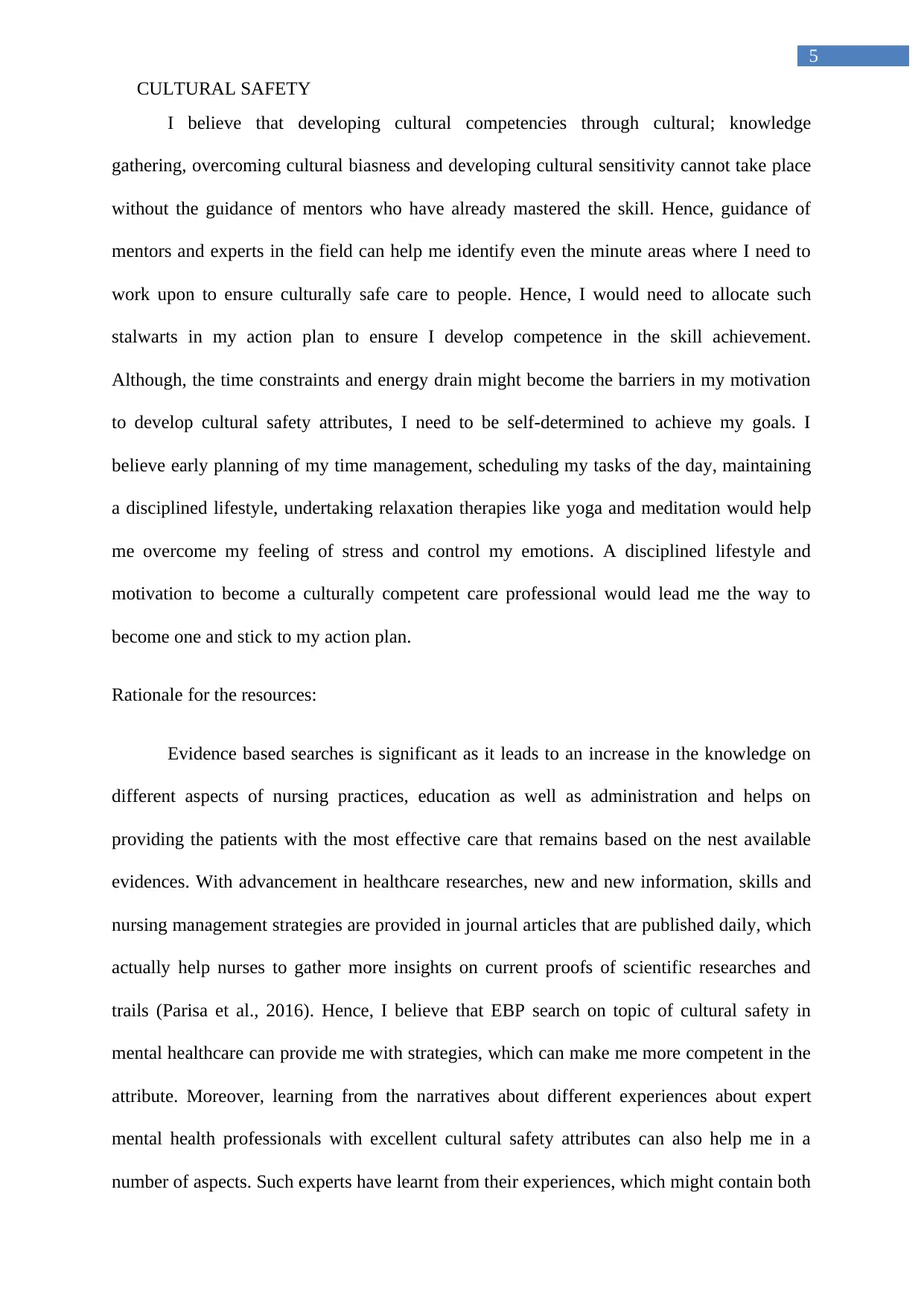
5
CULTURAL SAFETY
I believe that developing cultural competencies through cultural; knowledge
gathering, overcoming cultural biasness and developing cultural sensitivity cannot take place
without the guidance of mentors who have already mastered the skill. Hence, guidance of
mentors and experts in the field can help me identify even the minute areas where I need to
work upon to ensure culturally safe care to people. Hence, I would need to allocate such
stalwarts in my action plan to ensure I develop competence in the skill achievement.
Although, the time constraints and energy drain might become the barriers in my motivation
to develop cultural safety attributes, I need to be self-determined to achieve my goals. I
believe early planning of my time management, scheduling my tasks of the day, maintaining
a disciplined lifestyle, undertaking relaxation therapies like yoga and meditation would help
me overcome my feeling of stress and control my emotions. A disciplined lifestyle and
motivation to become a culturally competent care professional would lead me the way to
become one and stick to my action plan.
Rationale for the resources:
Evidence based searches is significant as it leads to an increase in the knowledge on
different aspects of nursing practices, education as well as administration and helps on
providing the patients with the most effective care that remains based on the nest available
evidences. With advancement in healthcare researches, new and new information, skills and
nursing management strategies are provided in journal articles that are published daily, which
actually help nurses to gather more insights on current proofs of scientific researches and
trails (Parisa et al., 2016). Hence, I believe that EBP search on topic of cultural safety in
mental healthcare can provide me with strategies, which can make me more competent in the
attribute. Moreover, learning from the narratives about different experiences about expert
mental health professionals with excellent cultural safety attributes can also help me in a
number of aspects. Such experts have learnt from their experiences, which might contain both
CULTURAL SAFETY
I believe that developing cultural competencies through cultural; knowledge
gathering, overcoming cultural biasness and developing cultural sensitivity cannot take place
without the guidance of mentors who have already mastered the skill. Hence, guidance of
mentors and experts in the field can help me identify even the minute areas where I need to
work upon to ensure culturally safe care to people. Hence, I would need to allocate such
stalwarts in my action plan to ensure I develop competence in the skill achievement.
Although, the time constraints and energy drain might become the barriers in my motivation
to develop cultural safety attributes, I need to be self-determined to achieve my goals. I
believe early planning of my time management, scheduling my tasks of the day, maintaining
a disciplined lifestyle, undertaking relaxation therapies like yoga and meditation would help
me overcome my feeling of stress and control my emotions. A disciplined lifestyle and
motivation to become a culturally competent care professional would lead me the way to
become one and stick to my action plan.
Rationale for the resources:
Evidence based searches is significant as it leads to an increase in the knowledge on
different aspects of nursing practices, education as well as administration and helps on
providing the patients with the most effective care that remains based on the nest available
evidences. With advancement in healthcare researches, new and new information, skills and
nursing management strategies are provided in journal articles that are published daily, which
actually help nurses to gather more insights on current proofs of scientific researches and
trails (Parisa et al., 2016). Hence, I believe that EBP search on topic of cultural safety in
mental healthcare can provide me with strategies, which can make me more competent in the
attribute. Moreover, learning from the narratives about different experiences about expert
mental health professionals with excellent cultural safety attributes can also help me in a
number of aspects. Such experts have learnt from their experiences, which might contain both
⊘ This is a preview!⊘
Do you want full access?
Subscribe today to unlock all pages.

Trusted by 1+ million students worldwide
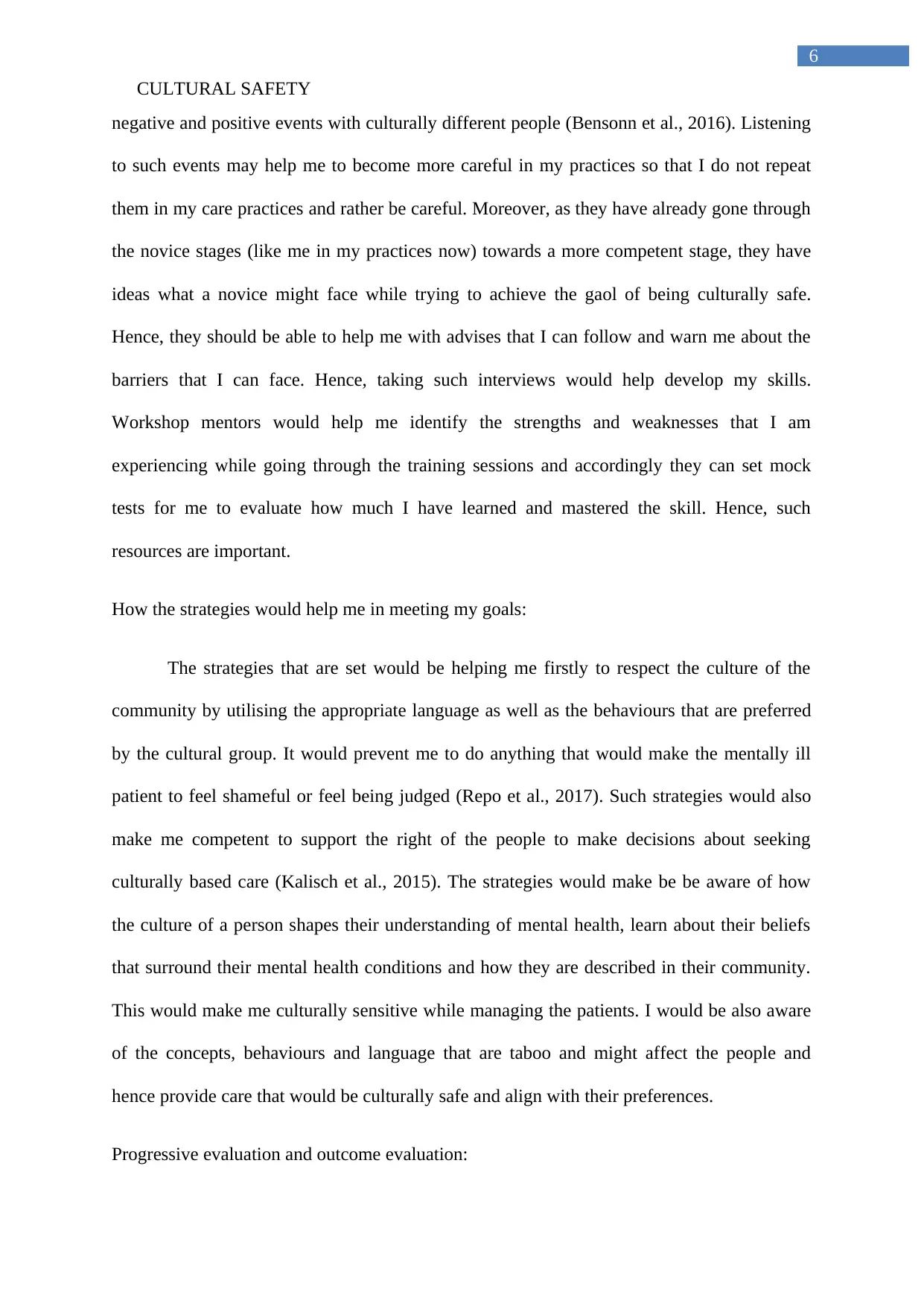
6
CULTURAL SAFETY
negative and positive events with culturally different people (Bensonn et al., 2016). Listening
to such events may help me to become more careful in my practices so that I do not repeat
them in my care practices and rather be careful. Moreover, as they have already gone through
the novice stages (like me in my practices now) towards a more competent stage, they have
ideas what a novice might face while trying to achieve the gaol of being culturally safe.
Hence, they should be able to help me with advises that I can follow and warn me about the
barriers that I can face. Hence, taking such interviews would help develop my skills.
Workshop mentors would help me identify the strengths and weaknesses that I am
experiencing while going through the training sessions and accordingly they can set mock
tests for me to evaluate how much I have learned and mastered the skill. Hence, such
resources are important.
How the strategies would help me in meeting my goals:
The strategies that are set would be helping me firstly to respect the culture of the
community by utilising the appropriate language as well as the behaviours that are preferred
by the cultural group. It would prevent me to do anything that would make the mentally ill
patient to feel shameful or feel being judged (Repo et al., 2017). Such strategies would also
make me competent to support the right of the people to make decisions about seeking
culturally based care (Kalisch et al., 2015). The strategies would make be be aware of how
the culture of a person shapes their understanding of mental health, learn about their beliefs
that surround their mental health conditions and how they are described in their community.
This would make me culturally sensitive while managing the patients. I would be also aware
of the concepts, behaviours and language that are taboo and might affect the people and
hence provide care that would be culturally safe and align with their preferences.
Progressive evaluation and outcome evaluation:
CULTURAL SAFETY
negative and positive events with culturally different people (Bensonn et al., 2016). Listening
to such events may help me to become more careful in my practices so that I do not repeat
them in my care practices and rather be careful. Moreover, as they have already gone through
the novice stages (like me in my practices now) towards a more competent stage, they have
ideas what a novice might face while trying to achieve the gaol of being culturally safe.
Hence, they should be able to help me with advises that I can follow and warn me about the
barriers that I can face. Hence, taking such interviews would help develop my skills.
Workshop mentors would help me identify the strengths and weaknesses that I am
experiencing while going through the training sessions and accordingly they can set mock
tests for me to evaluate how much I have learned and mastered the skill. Hence, such
resources are important.
How the strategies would help me in meeting my goals:
The strategies that are set would be helping me firstly to respect the culture of the
community by utilising the appropriate language as well as the behaviours that are preferred
by the cultural group. It would prevent me to do anything that would make the mentally ill
patient to feel shameful or feel being judged (Repo et al., 2017). Such strategies would also
make me competent to support the right of the people to make decisions about seeking
culturally based care (Kalisch et al., 2015). The strategies would make be be aware of how
the culture of a person shapes their understanding of mental health, learn about their beliefs
that surround their mental health conditions and how they are described in their community.
This would make me culturally sensitive while managing the patients. I would be also aware
of the concepts, behaviours and language that are taboo and might affect the people and
hence provide care that would be culturally safe and align with their preferences.
Progressive evaluation and outcome evaluation:
Paraphrase This Document
Need a fresh take? Get an instant paraphrase of this document with our AI Paraphraser
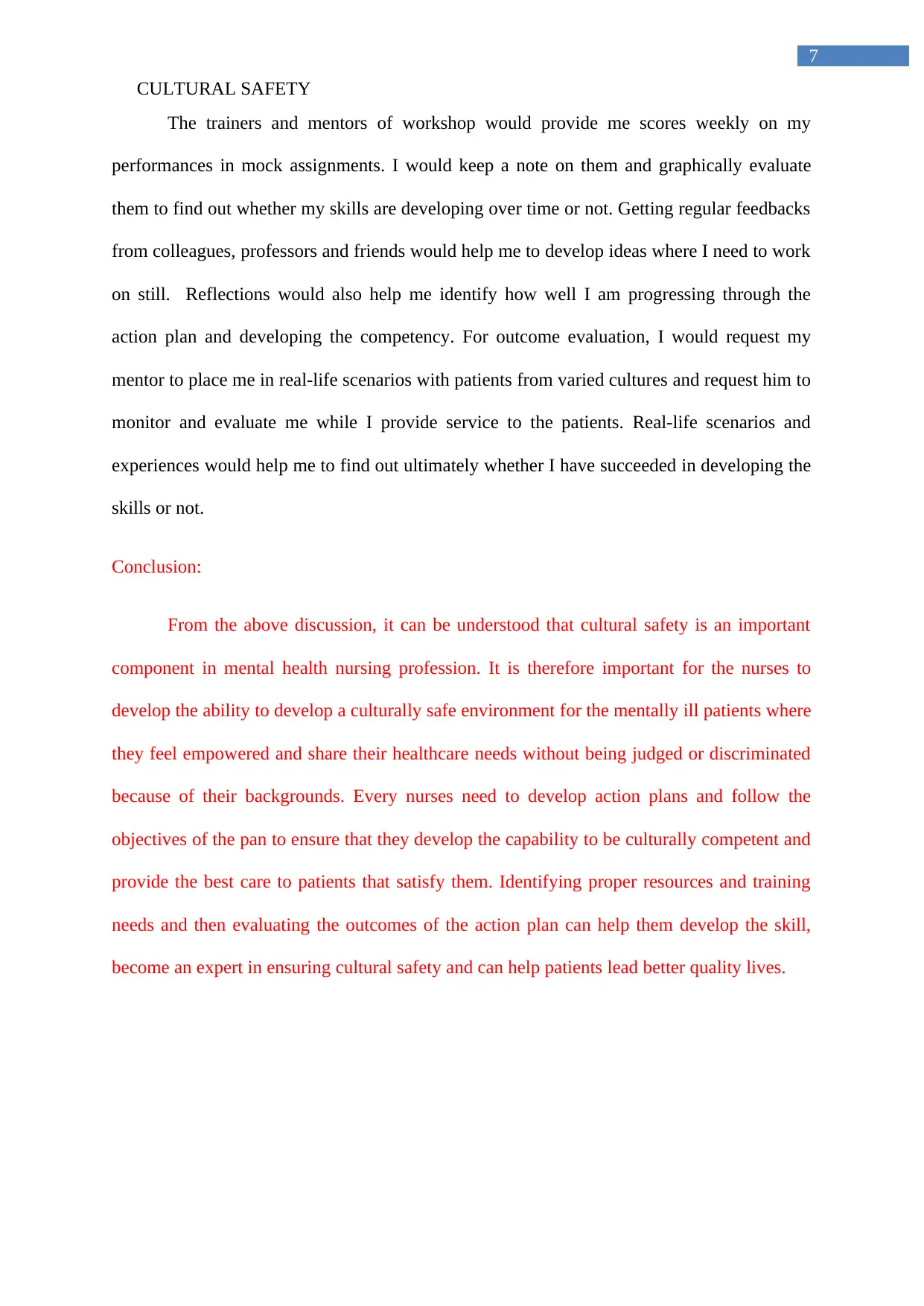
7
CULTURAL SAFETY
The trainers and mentors of workshop would provide me scores weekly on my
performances in mock assignments. I would keep a note on them and graphically evaluate
them to find out whether my skills are developing over time or not. Getting regular feedbacks
from colleagues, professors and friends would help me to develop ideas where I need to work
on still. Reflections would also help me identify how well I am progressing through the
action plan and developing the competency. For outcome evaluation, I would request my
mentor to place me in real-life scenarios with patients from varied cultures and request him to
monitor and evaluate me while I provide service to the patients. Real-life scenarios and
experiences would help me to find out ultimately whether I have succeeded in developing the
skills or not.
Conclusion:
From the above discussion, it can be understood that cultural safety is an important
component in mental health nursing profession. It is therefore important for the nurses to
develop the ability to develop a culturally safe environment for the mentally ill patients where
they feel empowered and share their healthcare needs without being judged or discriminated
because of their backgrounds. Every nurses need to develop action plans and follow the
objectives of the pan to ensure that they develop the capability to be culturally competent and
provide the best care to patients that satisfy them. Identifying proper resources and training
needs and then evaluating the outcomes of the action plan can help them develop the skill,
become an expert in ensuring cultural safety and can help patients lead better quality lives.
CULTURAL SAFETY
The trainers and mentors of workshop would provide me scores weekly on my
performances in mock assignments. I would keep a note on them and graphically evaluate
them to find out whether my skills are developing over time or not. Getting regular feedbacks
from colleagues, professors and friends would help me to develop ideas where I need to work
on still. Reflections would also help me identify how well I am progressing through the
action plan and developing the competency. For outcome evaluation, I would request my
mentor to place me in real-life scenarios with patients from varied cultures and request him to
monitor and evaluate me while I provide service to the patients. Real-life scenarios and
experiences would help me to find out ultimately whether I have succeeded in developing the
skills or not.
Conclusion:
From the above discussion, it can be understood that cultural safety is an important
component in mental health nursing profession. It is therefore important for the nurses to
develop the ability to develop a culturally safe environment for the mentally ill patients where
they feel empowered and share their healthcare needs without being judged or discriminated
because of their backgrounds. Every nurses need to develop action plans and follow the
objectives of the pan to ensure that they develop the capability to be culturally competent and
provide the best care to patients that satisfy them. Identifying proper resources and training
needs and then evaluating the outcomes of the action plan can help them develop the skill,
become an expert in ensuring cultural safety and can help patients lead better quality lives.
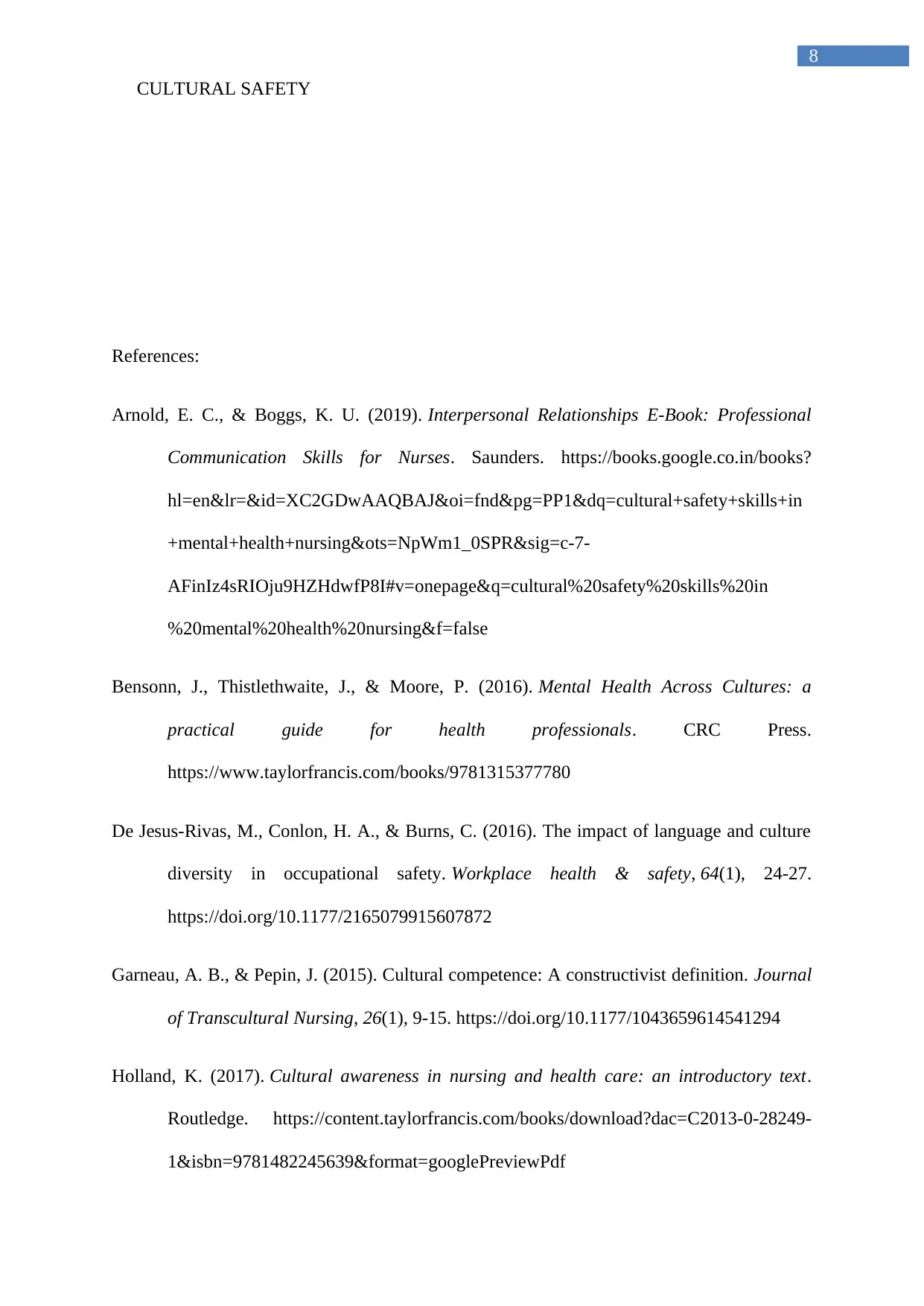
8
CULTURAL SAFETY
References:
Arnold, E. C., & Boggs, K. U. (2019). Interpersonal Relationships E-Book: Professional
Communication Skills for Nurses. Saunders. https://books.google.co.in/books?
hl=en&lr=&id=XC2GDwAAQBAJ&oi=fnd&pg=PP1&dq=cultural+safety+skills+in
+mental+health+nursing&ots=NpWm1_0SPR&sig=c-7-
AFinIz4sRIOju9HZHdwfP8I#v=onepage&q=cultural%20safety%20skills%20in
%20mental%20health%20nursing&f=false
Bensonn, J., Thistlethwaite, J., & Moore, P. (2016). Mental Health Across Cultures: a
practical guide for health professionals. CRC Press.
https://www.taylorfrancis.com/books/9781315377780
De Jesus-Rivas, M., Conlon, H. A., & Burns, C. (2016). The impact of language and culture
diversity in occupational safety. Workplace health & safety, 64(1), 24-27.
https://doi.org/10.1177/2165079915607872
Garneau, A. B., & Pepin, J. (2015). Cultural competence: A constructivist definition. Journal
of Transcultural Nursing, 26(1), 9-15. https://doi.org/10.1177/1043659614541294
Holland, K. (2017). Cultural awareness in nursing and health care: an introductory text.
Routledge. https://content.taylorfrancis.com/books/download?dac=C2013-0-28249-
1&isbn=9781482245639&format=googlePreviewPdf
CULTURAL SAFETY
References:
Arnold, E. C., & Boggs, K. U. (2019). Interpersonal Relationships E-Book: Professional
Communication Skills for Nurses. Saunders. https://books.google.co.in/books?
hl=en&lr=&id=XC2GDwAAQBAJ&oi=fnd&pg=PP1&dq=cultural+safety+skills+in
+mental+health+nursing&ots=NpWm1_0SPR&sig=c-7-
AFinIz4sRIOju9HZHdwfP8I#v=onepage&q=cultural%20safety%20skills%20in
%20mental%20health%20nursing&f=false
Bensonn, J., Thistlethwaite, J., & Moore, P. (2016). Mental Health Across Cultures: a
practical guide for health professionals. CRC Press.
https://www.taylorfrancis.com/books/9781315377780
De Jesus-Rivas, M., Conlon, H. A., & Burns, C. (2016). The impact of language and culture
diversity in occupational safety. Workplace health & safety, 64(1), 24-27.
https://doi.org/10.1177/2165079915607872
Garneau, A. B., & Pepin, J. (2015). Cultural competence: A constructivist definition. Journal
of Transcultural Nursing, 26(1), 9-15. https://doi.org/10.1177/1043659614541294
Holland, K. (2017). Cultural awareness in nursing and health care: an introductory text.
Routledge. https://content.taylorfrancis.com/books/download?dac=C2013-0-28249-
1&isbn=9781482245639&format=googlePreviewPdf
⊘ This is a preview!⊘
Do you want full access?
Subscribe today to unlock all pages.

Trusted by 1+ million students worldwide
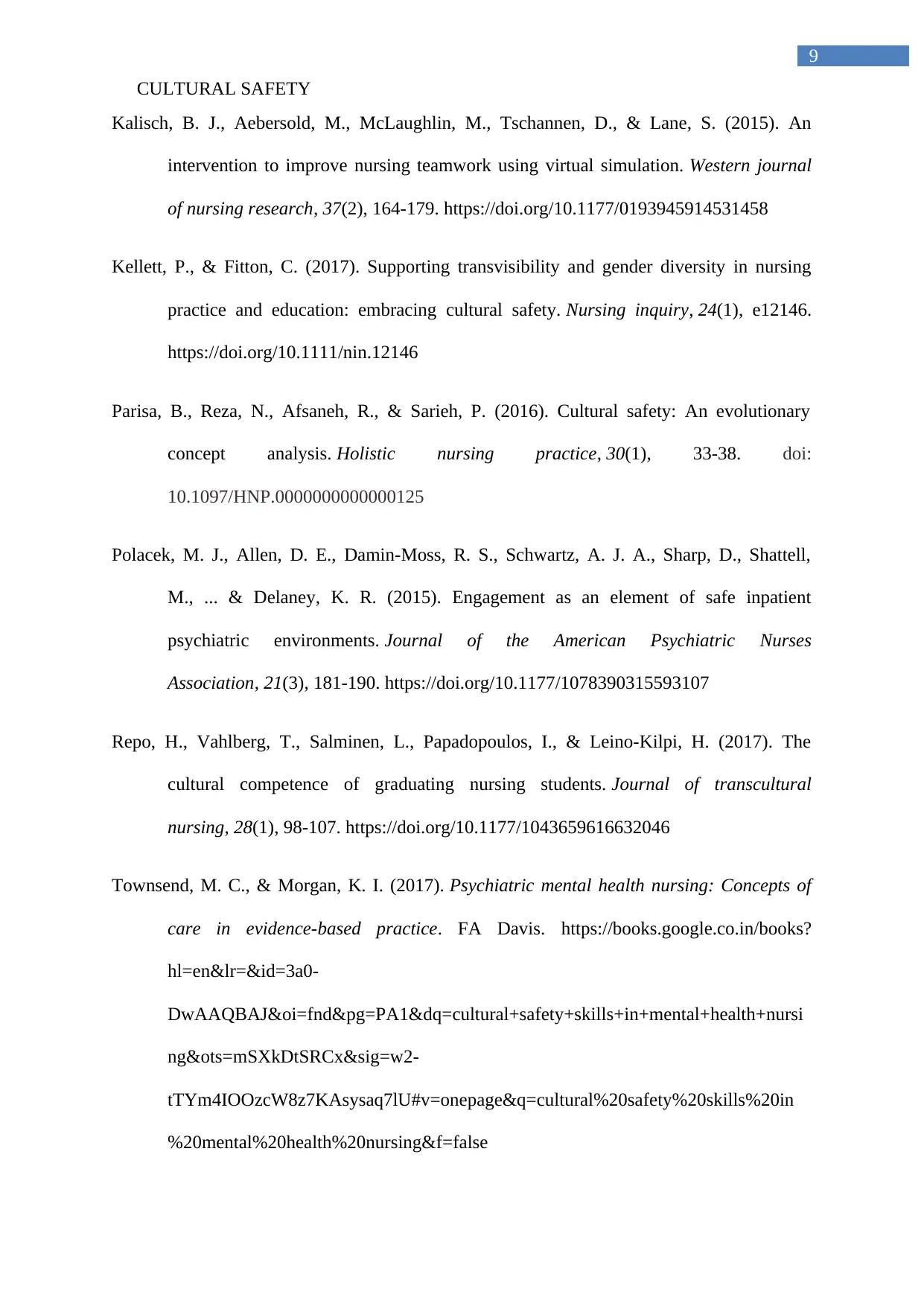
9
CULTURAL SAFETY
Kalisch, B. J., Aebersold, M., McLaughlin, M., Tschannen, D., & Lane, S. (2015). An
intervention to improve nursing teamwork using virtual simulation. Western journal
of nursing research, 37(2), 164-179. https://doi.org/10.1177/0193945914531458
Kellett, P., & Fitton, C. (2017). Supporting transvisibility and gender diversity in nursing
practice and education: embracing cultural safety. Nursing inquiry, 24(1), e12146.
https://doi.org/10.1111/nin.12146
Parisa, B., Reza, N., Afsaneh, R., & Sarieh, P. (2016). Cultural safety: An evolutionary
concept analysis. Holistic nursing practice, 30(1), 33-38. doi:
10.1097/HNP.0000000000000125
Polacek, M. J., Allen, D. E., Damin-Moss, R. S., Schwartz, A. J. A., Sharp, D., Shattell,
M., ... & Delaney, K. R. (2015). Engagement as an element of safe inpatient
psychiatric environments. Journal of the American Psychiatric Nurses
Association, 21(3), 181-190. https://doi.org/10.1177/1078390315593107
Repo, H., Vahlberg, T., Salminen, L., Papadopoulos, I., & Leino-Kilpi, H. (2017). The
cultural competence of graduating nursing students. Journal of transcultural
nursing, 28(1), 98-107. https://doi.org/10.1177/1043659616632046
Townsend, M. C., & Morgan, K. I. (2017). Psychiatric mental health nursing: Concepts of
care in evidence-based practice. FA Davis. https://books.google.co.in/books?
hl=en&lr=&id=3a0-
DwAAQBAJ&oi=fnd&pg=PA1&dq=cultural+safety+skills+in+mental+health+nursi
ng&ots=mSXkDtSRCx&sig=w2-
tTYm4IOOzcW8z7KAsysaq7lU#v=onepage&q=cultural%20safety%20skills%20in
%20mental%20health%20nursing&f=false
CULTURAL SAFETY
Kalisch, B. J., Aebersold, M., McLaughlin, M., Tschannen, D., & Lane, S. (2015). An
intervention to improve nursing teamwork using virtual simulation. Western journal
of nursing research, 37(2), 164-179. https://doi.org/10.1177/0193945914531458
Kellett, P., & Fitton, C. (2017). Supporting transvisibility and gender diversity in nursing
practice and education: embracing cultural safety. Nursing inquiry, 24(1), e12146.
https://doi.org/10.1111/nin.12146
Parisa, B., Reza, N., Afsaneh, R., & Sarieh, P. (2016). Cultural safety: An evolutionary
concept analysis. Holistic nursing practice, 30(1), 33-38. doi:
10.1097/HNP.0000000000000125
Polacek, M. J., Allen, D. E., Damin-Moss, R. S., Schwartz, A. J. A., Sharp, D., Shattell,
M., ... & Delaney, K. R. (2015). Engagement as an element of safe inpatient
psychiatric environments. Journal of the American Psychiatric Nurses
Association, 21(3), 181-190. https://doi.org/10.1177/1078390315593107
Repo, H., Vahlberg, T., Salminen, L., Papadopoulos, I., & Leino-Kilpi, H. (2017). The
cultural competence of graduating nursing students. Journal of transcultural
nursing, 28(1), 98-107. https://doi.org/10.1177/1043659616632046
Townsend, M. C., & Morgan, K. I. (2017). Psychiatric mental health nursing: Concepts of
care in evidence-based practice. FA Davis. https://books.google.co.in/books?
hl=en&lr=&id=3a0-
DwAAQBAJ&oi=fnd&pg=PA1&dq=cultural+safety+skills+in+mental+health+nursi
ng&ots=mSXkDtSRCx&sig=w2-
tTYm4IOOzcW8z7KAsysaq7lU#v=onepage&q=cultural%20safety%20skills%20in
%20mental%20health%20nursing&f=false
Paraphrase This Document
Need a fresh take? Get an instant paraphrase of this document with our AI Paraphraser
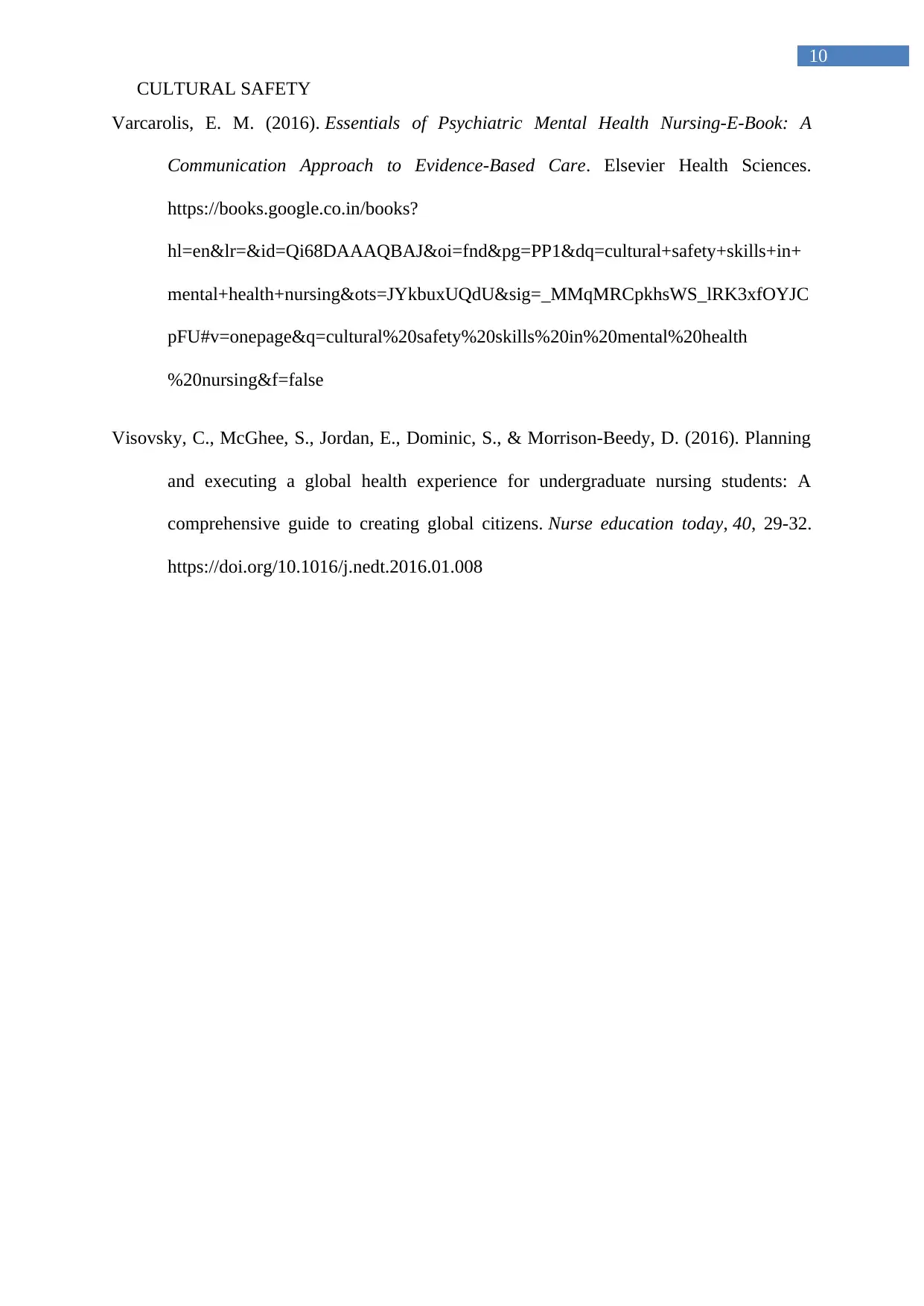
10
CULTURAL SAFETY
Varcarolis, E. M. (2016). Essentials of Psychiatric Mental Health Nursing-E-Book: A
Communication Approach to Evidence-Based Care. Elsevier Health Sciences.
https://books.google.co.in/books?
hl=en&lr=&id=Qi68DAAAQBAJ&oi=fnd&pg=PP1&dq=cultural+safety+skills+in+
mental+health+nursing&ots=JYkbuxUQdU&sig=_MMqMRCpkhsWS_lRK3xfOYJC
pFU#v=onepage&q=cultural%20safety%20skills%20in%20mental%20health
%20nursing&f=false
Visovsky, C., McGhee, S., Jordan, E., Dominic, S., & Morrison-Beedy, D. (2016). Planning
and executing a global health experience for undergraduate nursing students: A
comprehensive guide to creating global citizens. Nurse education today, 40, 29-32.
https://doi.org/10.1016/j.nedt.2016.01.008
CULTURAL SAFETY
Varcarolis, E. M. (2016). Essentials of Psychiatric Mental Health Nursing-E-Book: A
Communication Approach to Evidence-Based Care. Elsevier Health Sciences.
https://books.google.co.in/books?
hl=en&lr=&id=Qi68DAAAQBAJ&oi=fnd&pg=PP1&dq=cultural+safety+skills+in+
mental+health+nursing&ots=JYkbuxUQdU&sig=_MMqMRCpkhsWS_lRK3xfOYJC
pFU#v=onepage&q=cultural%20safety%20skills%20in%20mental%20health
%20nursing&f=false
Visovsky, C., McGhee, S., Jordan, E., Dominic, S., & Morrison-Beedy, D. (2016). Planning
and executing a global health experience for undergraduate nursing students: A
comprehensive guide to creating global citizens. Nurse education today, 40, 29-32.
https://doi.org/10.1016/j.nedt.2016.01.008
1 out of 11
Related Documents
Your All-in-One AI-Powered Toolkit for Academic Success.
+13062052269
info@desklib.com
Available 24*7 on WhatsApp / Email
![[object Object]](/_next/static/media/star-bottom.7253800d.svg)
Unlock your academic potential
Copyright © 2020–2026 A2Z Services. All Rights Reserved. Developed and managed by ZUCOL.





